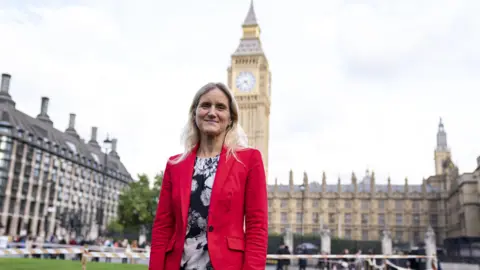Last-minute lobbying ahead of major assisted dying vote

 PA Media
PA Media
Last-minute lobbying is taking place across Parliament as MPs prepare to vote on an assisted dying bill for the first time in nearly a decade.
If passed, Labour MP Kim Leadbeater’s Terminally Ill Adults (End of Life) Bill would give people in England and Wales in certain circumstances the right to choose to end their own life.
MPs have been given a free vote, meaning they can decide based on their conscience rather than having to follow a party line, in what could be one of the most momentous decisions of their political lives.
The issue has split Parliament, generating strong opinions from both sides.
Some parliamentarians have been working as unofficial whips, pushing undecided MPs to back their cause, even in the final hours before Friday’s 14:30 GMT vote.
Ahead of Friday’s vote, Leadbeater said she hopes “MPs will show themselves, as they have in the past when major social reforms have come before them, ready to correct injustice and reduce human suffering”.
Meanwhile Conservative MP Danny Kruger, a vocal opponent of the bill, told the BBC he was pleading “with colleagues to think of those vulnerable people and vote no tomorrow”.
“I respect enormously voices on every side of this debate, but the truth is this bill has truly dangerous deficiencies,” he added.
Those known to be wavering have been invited to panel discussions and events advocating either position.
Both campaigns are running spreadsheets keeping a tally of MPs’ positions and who is yet to make up their mind, the BBC understands.
The campaigns and debate around assisted dying have been unlike any other legislation – in part due to the free vote.
MPs have described this as the hardest decision in their political careers.
Hundreds of MPs have spent the last few weeks sifting through the evidence, emotions and ethical dilemmas of the bill, with much of the work playing out in town halls and community centres.
On the eve of the vote, neither side sounded super confident, BBC political editor Chris Mason said – with both sides acknowledging there were lots of MPs who had not publicly said how they will vote.
And both sides say the debate could also prove crucial for some MPs, he added.
In the past few days Labour MP Jess Asato and Rebecca Paul, a Conservative, told the BBC they plan to vote against the bill after polling their constituents and speaking to experts.
Paul said she was worried the healthcare system is too stretched to ensure protection for vulnerable people.
Asato said she cannot support the bill as it lacks sufficient safeguards against vulnerable people being coerced into taking their own lives.
Other MPs are drawing on their personal experiences. Labour MP for Monmouthshire, Catherine Fookes, said watching her father suffer through a painful terminal illness has led her to support the bill.
Several MPs have also cited religious motivations for their decision, including Kruger and Justice Secretary Shabana Mahmood.
Even smaller parties like Reform UK have been split by the vote.
Party leader Nigel Farage announced he will vote against the bill, while his deputy Richard Tice and Reform MP for Great Yarmouth, Rupert Lowe, plan to support it.
The debate has also brought together some surprising allies. The longest serving male and female MPs, Tory Edward Leigh and Labour’s Diane Abbott are among several MPs saying they will reject the bill, arguing it has been rushed with poor consultation around the safeguards.
Former prime minister Lord David Cameron has changed his mind and backed the bill, after previously being opposed to assisted dying.
Lord Cameron said he believed the current proposal was “not about ending life, it is about shortening death”.
Previously his main concern had been that “vulnerable people could be pressured into hastening their own deaths”, but he said he believed the current proposal contained “sufficient safeguards” to prevent this.
Lord Cameron is so far the only ex-prime minister to support the bill after Gordon Brown, Baroness Theresa May, Boris Johnson and Liz Truss all said they were against it.
Prime Minister Sir Keir Starmer backed assisted dying when it was last debated in Parliament in 2015 – but has not revealed how he will vote this time round.
Asked whether his view on the matter had changed, he told a Downing Street press conference: “The vote is coming up… obviously the government is neutral on this and it is a genuinely free vote for all members of Parliament and I don’t want to put pressure on them.
“I’ve obviously got a huge amount of interest and experience in this.”
In his former role as director of public prosecutions, Sir Keir changed legal guidance to make it less likely that people motivated by compassion to help someone die would face prosecution.
On Friday, MPs will have five hours to debate the bill starting at 09.30 GMT.
The BBC understands 170 MPs have requested to speak in the debate meaning speeches are likely to be short – apart from Leadbeater’s speech setting out the bill.
This also means that it is likely not all MPs who want to speak will get a chance.
As private member’s bills do not come from the government, and as such do not get a programme motion which sets fixed amounts of times for debates, this leaves them vulnerable to procedural tactics like filibustering.
Given the support of the bill though these are likely to be ineffective.
At 14.30 voting will begin. To complicate matters, a group of MPs are pushing an amendment aimed at stopping the bill from progressing to a vote.
If the wrecking amendment is passed, or if the bill is rejected at second reading, that is the end of the road.
However, if the bill passes there are still many months of debate and parliamentary hurdles to clear before it has a chance of becoming law.








